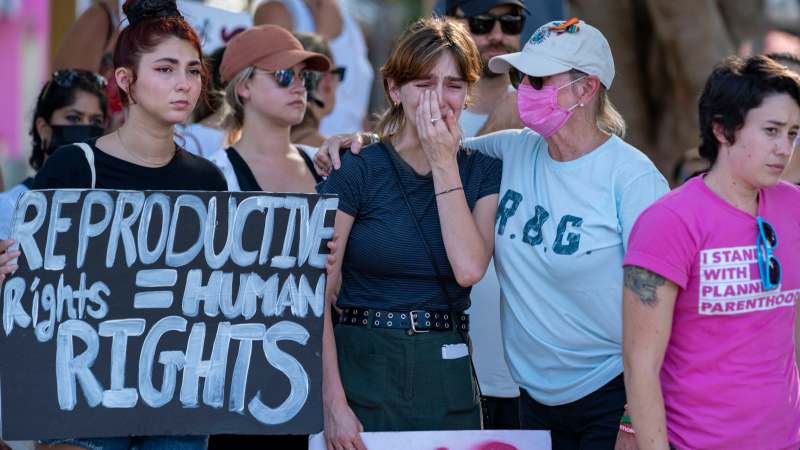Britney Spears' abortion comments spark talk about men's role in reproductive health care
In excerpts of her upcoming memoir, shared by People, Britney Spears wrote that she became pregnant with Justin Timberlake’s baby and had an abortion because he wasn’t ready to become a father.
“Justin definitely wasn’t happy about the pregnancy. He said we weren’t ready to have a baby in our lives, that we were way too young,” Spears writes in her book, according to People. "If it had been left up to me alone, I never would have done it. And yet Justin was so sure that he didn’t want to be a father."
“To this day,” Spears continues, “it’s one of the most agonizing things I have ever experienced in my life."
Spears’ statements underscore the benefits that male partners receive from having access to abortion care — an often overlooked aspect of reproductive health in light of Roe v. Wade’s downfall last year that, if ignored in society and politics alike, perpetuates the idea that abortion is solely a women’s issue.
“Abortion is a highly stigmatized form of healthcare, and women almost always bear the brunt of the stigma and shame around abortion,” said Bethany Everett, an associate professor of sociology at the University of Utah. “Yet, there are likely many people, including male partners, who don’t want to become parents or have another child, who also benefit from abortion access — benefits that are rarely recognized by the broader public or policy makers.”
Everett, who studies the social and political implications of reproductive health, said Spears' claim that Timberlake did not want to become a parent suggests he was aware that a child could “derail his career,” a reality that “men rarely publicly acknowledge” but is critical to recognize in a post-Roe world.
(On June 24, 2022, the Supreme Court overturned the constitutional right to abortion, leaving it up to states to determine its legality. Some states have since banned nearly all abortions, while others have passed legislation protecting abortion access.)
Timberlake has yet to publicly respond to Spears’ comments.
Andréa Becker, a medical sociologist and postdoctoral research fellow with the University of California San Francisco’s Advancing New Standards in Reproductive Health program, said this example is “consistent with the literature,” in that “men don’t necessarily have to come forward and tell their abortion stories if they don’t want to, even though it would benefit them immensely.”
This pattern is due in part to a lack of research analyzing how access to abortion impacts male partners, a shortfall that Becker said “reinforces the way we talk about birth control, condom use and pregnancy avoidance as a woman’s responsibility and issue.”
“We just forget about the sperm involved in creating a pregnancy,” Becker said.
As a result, stigmas associated with abortion disproportionately impact women.
“Men are rarely acknowledged as beneficiaries from abortion access so it is much easier for them to avoid the stigma and shame around abortion if they don’t think it’s something that impacts them personally,” Everett said.
Data show that 1 in 5 men in the U.S. have been involved in abortion, which researchers say is likely an undercount. It's estimated that about 1 in 4 women in the U.S. will have an abortion by age of 45, according to the Guttmacher Institute.
The total number of abortions in the U.S. is difficult to measure, but the most recent estimates from 2020 show that there were anywhere between 620,000 to 930,000, according to data from the CDC and Guttmacher Institute. (The number of abortions in the U.S. dropped immediately after the fall of Roe v. Wade.)
Meanwhile, research has found that some men are hesitant to admit their involvement with abortion. In a 2022 study, men were less likely to disclose the fact they were involved in an abortion during face-to-face interviews compared to an online survey.
In one of the few studies to analyze how abortion impacts male partners, Everett found that men who impregnated someone as a teenager were more likely to pursue post-high school education and graduate from college when the pregnancy ended in abortion compared to those that ended in live birth.
More on maternal health care inequities:Inequities in maternal health care access are not new. They have deep roots in history.
“When men don’t speak up, the burden of having to make decisions about unplanned pregnancies and access to abortion falls exclusively on women — and that’s an equity issue,” said Dr. Brian Nguyen, an associate professor of obstetrics and gynecology at the University of Southern California’s Keck School of Medicine. Nguyen runs a research group called the EMERGE Lab that conducts studies aimed at ensuring men recognize their responsibility in women’s reproductive health and gender equity.
While questions still abound about what role male partners should have in the abortion landscape, it’s important to recognize the general lack of knowledge about abortion in the U.S., particularly among some men, Becker said. Consequently, research shows many policy decisions now in place threaten the lives of women and girls who would benefit from abortion care, especially for people of color, migrants, people with disabilities, and those living on low incomes or in rural areas.
"Men do have a place in advocating for reproductive rights,” Everett said. “They can donate to abortion funds and reproductive health care organizations, and, importantly, with the consent of their partners, acknowledge how abortion access has benefited them.”

Disclaimer: The copyright of this article belongs to the original author. Reposting this article is solely for the purpose of information dissemination and does not constitute any investment advice. If there is any infringement, please contact us immediately. We will make corrections or deletions as necessary. Thank you.







